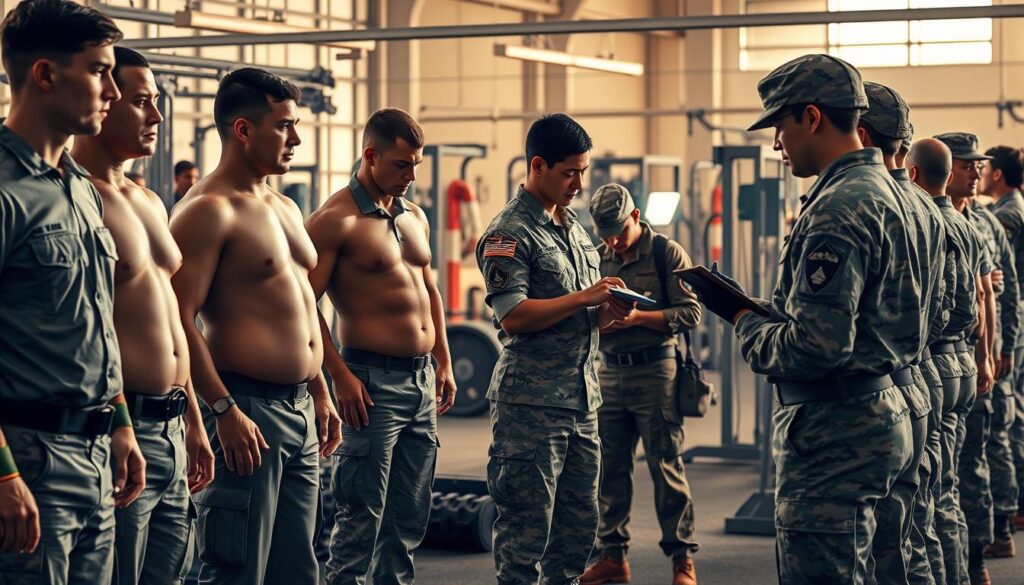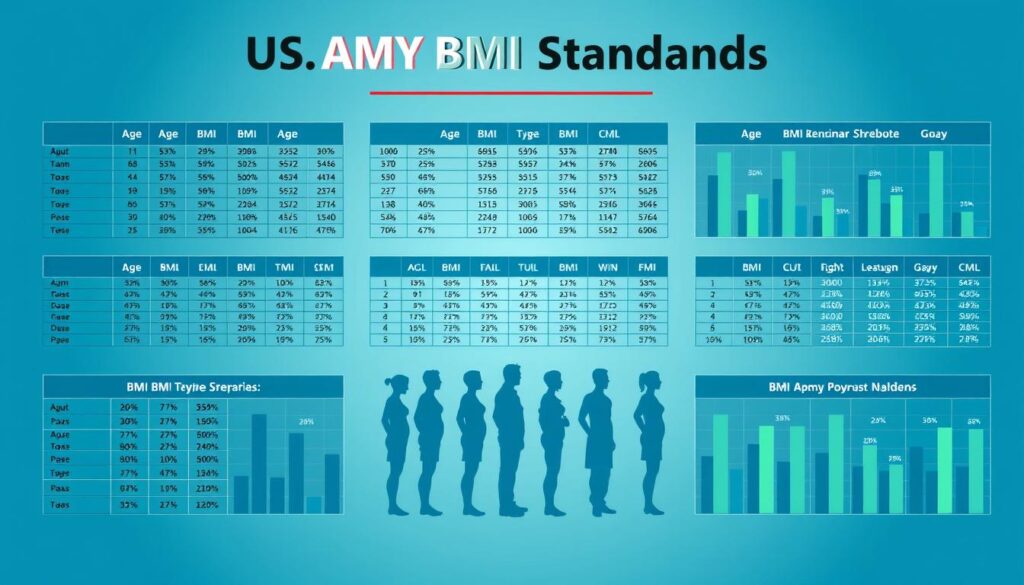Do you know what physical standards soldiers must meet to join the military? The US military has strict height and weight standards to ensure soldiers are physically healthy and ready for their jobs.
To check if a soldier is healthy for military duty, height and weight are key. The military looks at body mass index to see if soldiers are at a healthy weight for their height.
This check is vital for a strong and effective military. It makes sure soldiers can handle their duties and stay safe from injuries.
Key Takeaways
- The US military has specific height and weight requirements.
- Body mass index is used to assess a soldier’s health.
- These standards are crucial for maintaining a well-prepared military force.
- Height and weight standards help minimize the risk of injury.
- Soldiers must meet these physical requirements to serve.
Introduction to Army BMI Standards
Army BMI standards are key to a strong military. They help soldiers do their jobs well and safely.
Importance of BMI in the Military
The Body Mass Index (BMI) is crucial for the military. It checks if a soldier is fit for duty. A good BMI means less injury risk and better performance in tough situations.
A soldier’s BMI shows if their weight is healthy for their height. This is important because it affects their ability to do hard tasks and react quickly in emergencies.
Overview of Army Weight Regulations
The Army has strict weight rules based on age, gender, and height. These rules help soldiers stay healthy and fit for duty.
The maximum weight allowed depends on height and age. Younger soldiers can weigh a bit more because they have more muscle.
| Height (inches) | Age 17-20 | Age 21-27 | Age 28-39 |
|---|---|---|---|
| 60 | 132 | 134 | 136 |
| 65 | 154 | 157 | 160 |
| 70 | 179 | 183 | 187 |
Following these rules helps soldiers meet Army BMI standards. This boosts their fitness and readiness for duty.
Calculating BMI for Military Personnel
The Army uses BMI to check body composition. This method is based on a well-known formula. It helps figure out if a soldier fits the Army’s body standards.
Formula for BMI Calculation
The BMI formula is simple: BMI = weight (in kg) / height (in meters)2. For example, a soldier weighing 70 kg and 1.75 meters tall would have a BMI of 22.9.
To help soldiers, here’s how to calculate BMI in a more common system:
- First, change your weight from pounds to kilograms by dividing by 2.205.
- Then, change your height from inches to meters by dividing by 39.37.
- Next, square your height in meters.
- Finally, divide your weight in kilograms by your height in meters squared to find your BMI.
Understanding BMI Categories
The Army divides BMI into several groups to check body composition. These groups are:
- Underweight: BMI less than 18.5
- Normal weight: BMI = 18.5-24.9
- Overweight: BMI = 25-29.9
- Obese: BMI 30 or greater
Knowing these categories is key for soldiers. It tells them if they need to lose or gain weight. This is to meet Army standards.
By using BMI and knowing the categories, soldiers can work to meet Army standards. These standards are to ensure they are ready for duty.
Army BMI Requirements by Gender and Age
Keeping military BMI standards is key, and they vary by gender and age. The Army has set specific height and weight rules. These ensure soldiers stay fit for duty.
Standards for Males
Male soldiers must meet BMI standards that change with age. For example, 17-20 year olds have a max weight based on height. As age increases, so does the max weight, reflecting body changes over time.
Standards for Females
Female soldiers also have BMI requirements that change with age. For instance, women aged 17-20 have a max weight at 60 inches, which is lower than men’s. It’s vital for women to know these standards to stay fit and ready.
Here’s a table showing max weights for male and female soldiers at different heights and ages, based on Army regulations.
| Age Group | Height (inches) | Max Weight for Males (pounds) | Max Weight for Females (pounds) |
|---|---|---|---|
| 17-20 | 60 | 132 | 119 |
| 21-27 | 60 | 136 | 121 |
| 28-39 | 60 | 139 | 124 |
The table shows that max weight increases with age for both genders. But, males can weigh more than females at the same height. Soldiers need to know these standards to plan their fitness and nutrition.
For more details on Army BMI standards and how to meet them, soldiers can check official guidelines and resources.
Consequences of Not Meeting BMI Standards
Not meeting Army BMI standards can harm health and career. Soldiers who don’t meet these standards face many negative outcomes.
Health Implications
Not following Army BMI standards can cause serious health problems. Being overweight or underweight can lead to obesity, diabetes, and heart disease. It’s key to keep a healthy weight for well-being and top physical shape.
Health Risks Associated with Noncompliance:
- Increased risk of chronic diseases
- Reduced physical fitness and performance
- Higher susceptibility to injuries
An overweight soldier might struggle with mobility and endurance. This makes it hard to do their job well. It’s important for soldiers to know the health risks and work on keeping a healthy body.
Impact on Military Career and Promotions
Not meeting Army BMI standards can hurt a soldier’s career. It might lead to disciplinary actions like counseling or even being kicked out. Also, soldiers who don’t meet standards might not get promotions or special jobs, which can slow down their career.
| Career Impact | Description |
|---|---|
| Disciplinary Actions | Counseling, retraining, or dismissal |
| Promotion Eligibility | Ineligibility for promotions or special assignments |
| Career Advancement | Limited opportunities for career progression |
To avoid these problems, soldiers must follow the Army’s height and weight rules. Keeping a healthy body helps ensure a good military career and overall health.
It’s important for soldiers to understand the risks of not meeting Army BMI standards. By following the rules, they can avoid health problems and have a successful military career.
Strategies to Achieve Army BMI Standards
Soldiers can use Army resources to meet BMI standards. This includes exercise programs and nutrition advice. It’s not just about the numbers; it’s about living healthy and performing better.
Nutritional Guidance for Soldiers
Eating right is key for soldiers to meet army height and weight regulations. A diet full of fruits, veggies, lean proteins, and whole grains is best. They should skip processed foods and snacks, choosing meals that give them energy.
Drinking water is also important. It keeps soldiers performing well and healthy. The Army suggests drinking 8-10 glasses of water daily, based on activity and environment.
Effective Exercise Routines
Exercise is crucial for soldiers to keep maintaining military BMI standards. A good workout includes cardio, strength training, and flexibility. Cardio helps the heart and burns calories. Strength training builds muscle and boosts metabolism.
- Cardiovascular exercises: running, cycling, swimming
- Strength training: weightlifting, bodyweight exercises
- Flexibility exercises: yoga, stretching
Soldiers should do at least 150 minutes of cardio weekly. They also need muscle-strengthening activities on two or more days a week.
Conclusion and Resources
It’s key for soldiers to meet army BMI standards to stay healthy and follow military rules. The Army helps with this by offering nutrition advice, fitness checks, and mental health support.
Guidelines for Maintaining a Healthy Lifestyle
The Army’s Wellness Program helps soldiers with personalized plans. They can also use MyHealth.mil to talk to dietitians online. This way, they can build good habits and keep a balanced life.
Additional Resources for Army Personnel
For details on army BMI standards and military weight requirements, soldiers should check the Army’s website. They can also talk to health and fitness experts in their unit. Online sites like Military.com and Task & Purpose have tips on staying healthy and at a good weight.



